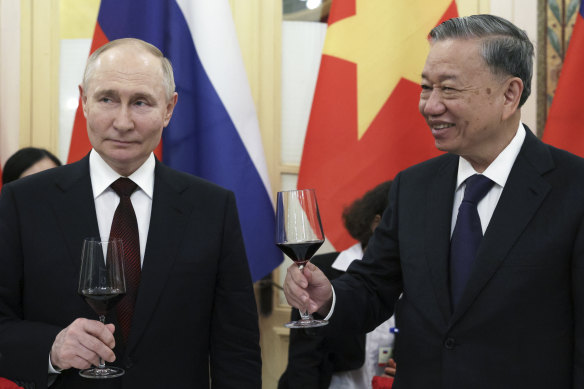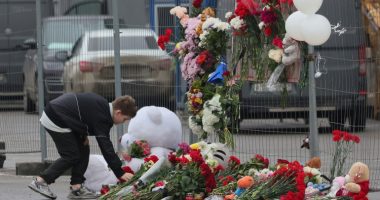With Western officials more inured to Putin’s threats than during the early days of the war, the Russian leader has changed the content and turned up the volume, asking rhetorically at one point on Thursday why Moscow shouldn’t “go all the way” — an apparent reference to nuclear war — if the West indeed is seeking its “strategic defeat”.
Loading
From the start, Putin has used the threat of nuclear war as a way to deter Western nations from supporting Ukraine. When he launched his full-scale invasion in early 2022, he warned any country considering intervening that they would face consequences “such as you have never seen in your entire history”.
Initially, the threat worked. President Joe Biden’s administration made the avoidance of nuclear war the North Star of its Ukraine policy. The United States and its allies withheld a full suite of sophisticated weapons from Ukraine out of fears that Putin would carry out a nuclear strike or retaliate directly against a NATO member state.
The latest change — permission for Ukraine to conduct limited strikes into Russia to defend itself against cross-border attacks — appears to have Putin feeling the heat. Since that shift, he has frequently mentioned his nuclear arsenal and suggested other ways Russia could escalate in response to the West.
Sceptics of Putin’s rhetoric say they see little reason for him to use a nuclear weapon. A senior NATO official, speaking on condition of anonymity to discuss private assessments, said the alliance judged it “unlikely” that Putin would use nuclear weapons in the conflict and hadn’t seen any changes to Russia’s nuclear posture to suggest otherwise.

Old friends: Russian President Vladimir Putin and Vietnamese President To Lam toast during a gala reception after their talks in Hanoi on Thursday.Credit: AP
But Putin showed in North Korea that he can take measures short of firing off a nuclear weapon and far afield from Ukraine, and still unnerve the United States and its allies.
The Russian leader’s willingness to brandish the possibility of arming North Korea, which earlier in Putin’s tenure as president would have been unthinkable, shows how much the war in Ukraine has become a singular, defining principle of his foreign policy and his rule.
“Russian foreign policy is now structured around the war,” Gabuev said. “In every relationship, there are three goals: first, support for the Russian military machine; second, support for the Russian economy under sanctions; and three, how can I instrumentalise this relationship to inflict pain on the US and its allies for their support of Ukraine?”
The discomfort could go beyond arming Kim. A comment Putin made earlier this month in St. Petersburg, Russia, led some analysts to suggest that he was considering giving weapons to the Houthis, the Iran-backed Shiite militants in Yemen, who have been attacking US vessels and aircraft in and around the Red Sea, or other groups hostile to the United States and its allies.
Loading
Doubters of Putin’s nuclear saber-rattling reason that Russia is on the front foot in Ukraine, making him unlikely to do anything dramatic that could further mobilise Ukraine’s backers or jeopardise his battlefield trajectory. Former President Donald Trump, who has made clear his distaste for US spending on Ukraine, may be back in the White House in seven months.
“If Russia is fundamentally confident that the future is better than the past, then that makes the use of nuclear weapons very unlikely,” said Nigel Gould-Davies, senior fellow at the International Institute for Strategic Studies and a former UK ambassador to Belarus.
Still, some analysts worry that Western desensitisation to Putin’s warnings have created a precarious situation.
In Moscow, a foreign policy expert who has advised the Kremlin acknowledged that Russia at times has cried wolf, “but the wolf never appeared”.

Russian President Vladimir Putin, right, walks as North Korea’s leader Kim Jong-un shakes hands with the Russian delegation.Credit: AP
There is a growing sense in Moscow, the person said, that Russia’s threats directed at the West had not been sufficiently convincing and that it was necessary to raise the temperature a little bit.
Beyond arming America’s adversaries, including North Korea and Iran, experts in Moscow were discussing the possibility of cyber or space attacks, the person said. He spoke on condition of anonymity because he feared retribution for speaking with an American news outlet.
Andrea Kendall-Taylor, a senior fellow at the Centre for a New American Security, said there was now an increased risk of an unintended escalation, where one side takes an action based on a misperception of what the other is doing. Officials in the United States, for example, recently expressed worries about the Kremlin misinterpreting Ukrainian attacks against Russian sites that are part of Moscow’s nuclear early-warning system.
“I think we keep focusing on nuclear escalation, and it’s distracting us from fully coming to grasp all the ways he is escalating out of that domain,” Kendall-Taylor said.

Russian President Vladimir Putin.Credit: AP
Rogue arms transfers or increased sabotage attacks outside Ukraine would be a logical escalation for Putin, analysts say, given Russia’s unique Soviet inheritance: global reach, weapons-making prowess and intelligence services skilled in unconventional warfare.
“People knock Russia and say it is a declining power,” said Bobo Lo, a nonresident fellow at the Lowy Institute in Sydney and a former Australian diplomat in Moscow. “But it is still a formidable disruptive power. That’s its comparative advantage. It not only has the capability to disrupt; it has the will.”
This article originally appeared in The New York Times.
Read More: World News | Entertainment News | Celeb News
SMH








